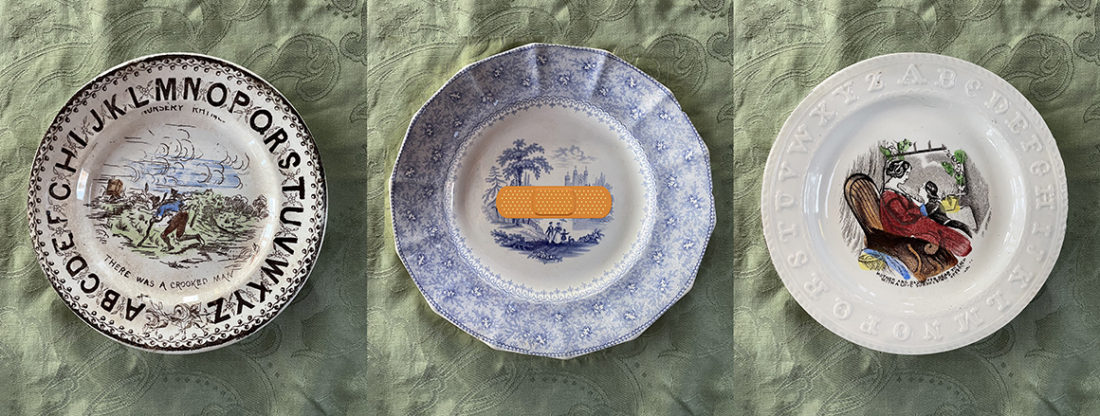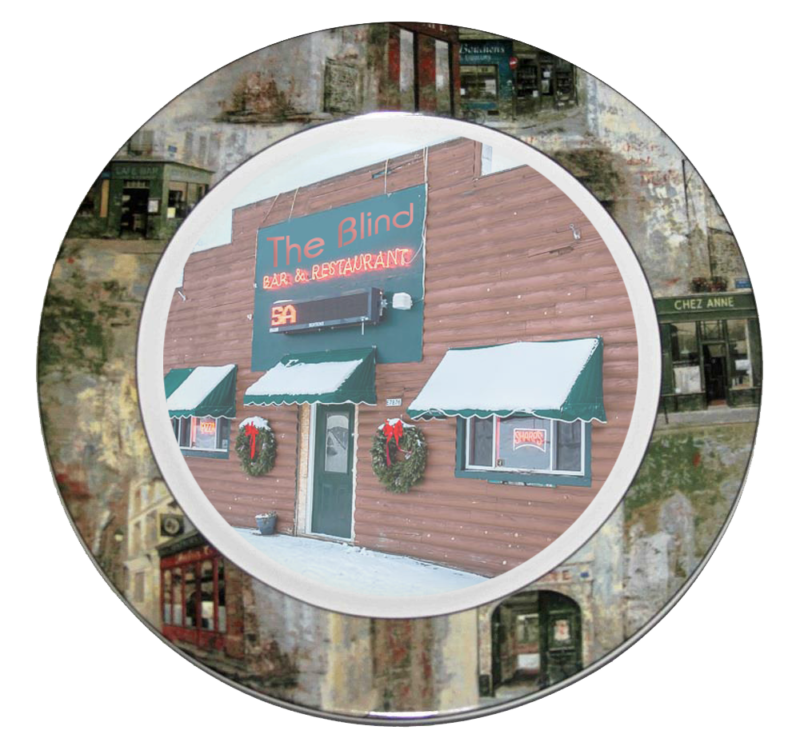The Blind used to be a neighborhood bar in this far northern town at the edge of the world. And because of that, the interior had to rock. It had to be a place where people who inhabit the dark and cold latitudes could come in and find solace in alcohol and good cable and run into other friendly bodies shedding layers and swapping stories. There had to be good heat and there still is, the furnace blasting gales of cooked air from the overhead vent, the beast clicking on every time the front door swings open, which isn’t often these days.
Because when Covid hit, The Blind’s indoors had been abandoned and a half slapdash patio and covered dining area constructed. A half dozen outdoor heaters had been bought at outrageous cost. The QR code cards had been carefully taped to the newly polyed tables, but kept peeling off in the rain and flying away in the breeze. Mike, the owner, had added dog bowls and tried for some Up North humor by installing a pole with signs pointing to Acapulco and Key West, along with distances probably Googled from his phone which had a cracked screen.
Tourists tend to use the new side entrance with its loud sign: “This way to our new outdoor seating.” But the regulars still open the warped screen door that slams shut on their behinds announcing their arrival to the bartender.
This Sunday morning’s bartender is Carl. Carl used to be just the bartender but when the place closed down in the early times as fear shut doors and there were no answers and no vaccines, all the other employees retreated to their apartments or their parents’ basements. There, as they messaged Carl, they were passing the time applying for unemployment and stimulus checks and payouts and combat pay through the (probably) cracked screens of their phones. But then, when the fog lifted or at least was temporarily burned off by some science and a vaccine, those employees hadn’t returned and now the help wanted sign is the only thing that is regularly retaped.
Now Carl is bartender, cook, server and dishwasher. In that order. Which isn’t too tough because The Blind barely grosses three hundred a day in the off season. Carl wishes he owned the place so he could sell it, but that fantasy doesn’t last long. He figures it would pay the bills for about six months and then he would be on his ass again, only this time without a job or a bar. Mike has his VA pay and owns the building and so he makes it work. Just.
The Blind sells booze and serves white fish. A lot of white fish. Broiled, fried, sandwiched, salad-ed, chilled, pate-ed. There’s tater tots or fries. They used to do a brisk breakfast business, but people got broke and started buying their own eggs and bacon. Back when people went to the church across the street there was a good crowd for Sunday breakfast. Kids bounced through the warped screen door all scrubbed up and ready to chow down on pancakes, fathers tucked into steak and eggs, mothers lassoed little ones into their booster seats. Really, it was a slice, Carl recalls and finds himself smiling into the dusk of the overheated barroom. Carl never used to work Sunday mornings because he had worked closing on Saturday nights. Last call used to be 12:45. Now it’s eleven and usually by then there’s no one to kick out anymore.
And now since he’s The Blind’s one and only employee, he opens on Sunday and slings some hashbrowns to lost souls needing a carbo lift. Carl loves the smell of ham and bacon and potatoes on the grill. He’s got the over easy, over medium timing down to a science without a watch. And since Saturday night is no longer a marathon of pouring shots and beers and wiping up spills and having long, slow, soft conversations with people he has to cut off, (always soft and slow, owner Mike had taught him), he can go home and grab six or so hours of sleep and then be right as rain for the Sunday morning few.
Last summer when they opened up again, Carl suggested to Mike that the tourists had been asking for craft brew and they might clear some profit if The Blind stocked some. Now there are all kinds of new beer with fancy can designs to choose from. You can charge twice as much for a can of that stuff and it has a higher alcohol content so it makes drinkers twice as happy twice as fast. Plus, it’s the tourists who drink craft beer and their credit cards are smoking and at the ready. Summer’s short up here and you have to make hay. When Mike had said OK, go for it, the only snag had been that there was not enough space behind the bar, so they had converted an old Pepsi cooler into a self-serve beer vault. It was easy to stock and people were mostly honest and didn’t balk at the prices especially if they were from down state because The Blind could still come in a buck or so cheaper than back home, wherever that was.
Munising has always been home for Carl. As a kid his mom had dragged him and his sisters to the church across the street which used to gleam white on frigid January mornings. They had been one of the families who tucked into The Blind after church even though his father had always grumbled at the expense. Sunday afternoons Carl had played hockey or gone ice fishing with his dad and uncles while they were still up for it.
He remembered, as a boy, believing in God for a while. Or Jesus. Jesus was a better bet because he had lived and died like them and could relate. And Jesus was always forgiving people who trespassed against him. Carl liked that. The forgiving part.
He had actually left home a believer, and lasted almost two years at Northern. There he had wandered into classes where he heard about interesting places and people and ideas. There he had also discovered psilocybin and then for a minute he thought Jesus could hear him. Then poof. Jesus went up in smoke and Carl lost his scholarship and came home to contemplate the woods and the sky. Then the psilocybin ran out and there was only meth left and even at nineteen Carl had figured out that was no game.
Living at home turned out to be no game either. His father had given him his notice and so Carl had started looking around for something easy, something temporary. Something that wouldn’t turn into a career, that would serve as a medium stopover in his life which was no doubt going to improve any minute. He remembers timing his entrance into The Blind just right: a Saturday afternoon in July, totally slammed with tourists, people slinging dishes and mugs and screaming into the kitchen while the kitchen screamed back and items were being crossed off the blackboard menu. Carl had strolled up to the bar and asked if they needed any help. The bartender that day, as it turned out, had been Owner Mike and he had simply smirked in reply, reached under the bar, pulled out a dirty apron, said, “put this on and do what she tells you,” pointing to a haggard blonde waitress who, at that moment, if memory served, had been delivering ketchup, mustard, hot sauce and extra napkins to a six top of hungry drunks.
Well, Carl had known how to do that. And so he did what he was told and had a few good years, good enough so that he could just make it to April before starting to lean on his credit card. During those first couple years he had made two or three plans, schemes to leave home, find a trade that he could make a living at. And just when he thought, yeah, the pieces are coming together, trade school in view and some money saved, and he was searching up apartments in Grand Rapids, the Covid had hit.
And then Carl wasn’t going anywhere. The weeks turned into months as the conspiracy theories raged around him and the woods and the roads and the front yards got covered in signs that started out polite and spiraled down from there. For a time, amusement could be found watching the town council meetings through the screen of his phone. There the citizens who had lost their jobs and their happiness and sometimes their loved ones, yelled across the room at others they had found to blame for their losses. The world had gone nuts and the people along with them. It made for some entertainment for a while.
Then, nothing was funny anymore. The laughter quieted and even the things that used to be funny weren’t any longer. Carl remembers reading a book in high school. The Catcher in the Rye. That had been his first experience with the strange feeling of not being able to laugh at jokes, at coming to see that under jokes lived pain and death and loneliness. Holden starts out as this funny guy and Carl had kept reading the book because he thought it was going to be a hoot all the way through. Then it stopped being funny, and even when Holden said something was hilarious, you didn’t want to laugh. And Phoebe, his little sister, was always trying to get him to stop kidding.
She had asked him once, Phoebe had asked Holden that is, when they were in Central Park in New York City, where the ducks go in the winter. Holden, being a city boy, of course didn’t know the answer and this pissed Phoebe off. Carl remembered trying to find this funny. Everybody knew where the ducks went in the winter. Didn’t they?
Carl remembers Phoebe and her questions on this quiet Sunday morning. In the background, he hears the soothing muttering and clattering of his two tables as the patrons enjoy their bacon and pancakes. Carl checks the coffee pot, moves it off the warmer so it doesn’t burn. Then he turns back to his bar and begins to wipe it down although it is already clean. He swipes at phantom spills, then opens the towel, rinses it in the clean soapy water below, wrings it out and refolds it and continues wiping, in slow circles now, over the gleaming surface of the wood.
See more at https://panngoe.wixsite.com/ann-goethals--writer

